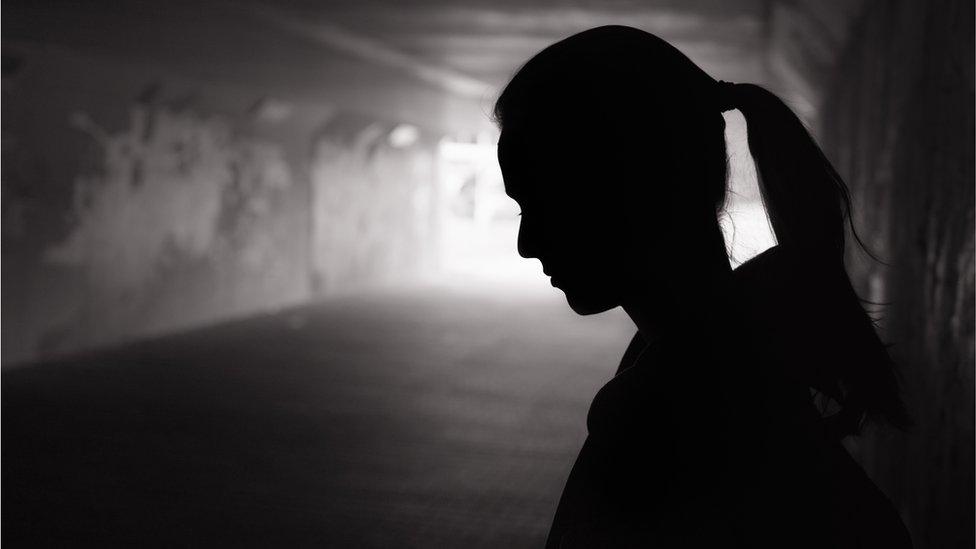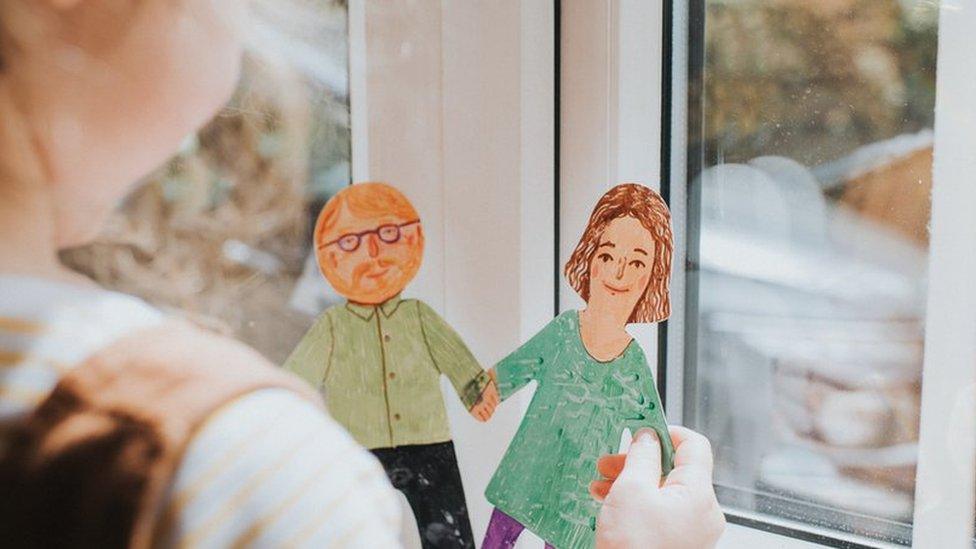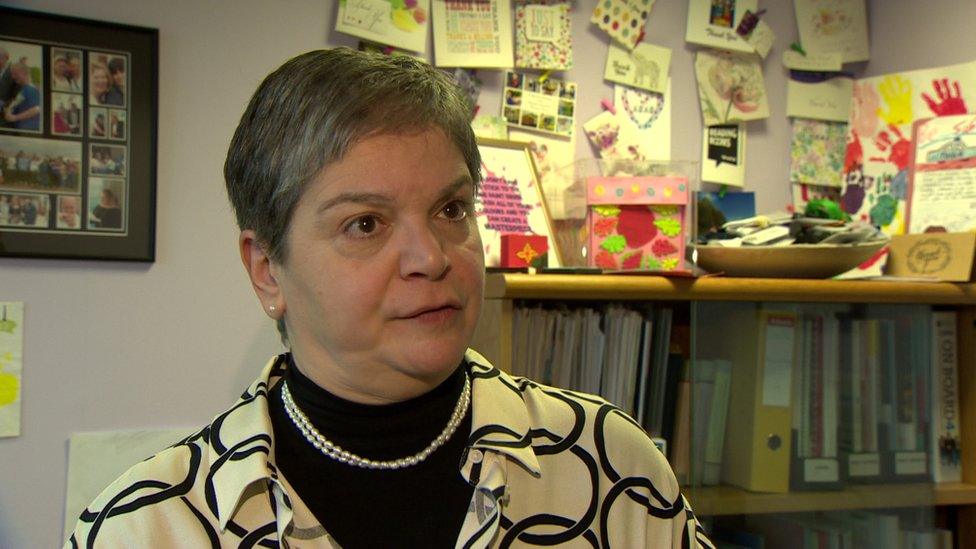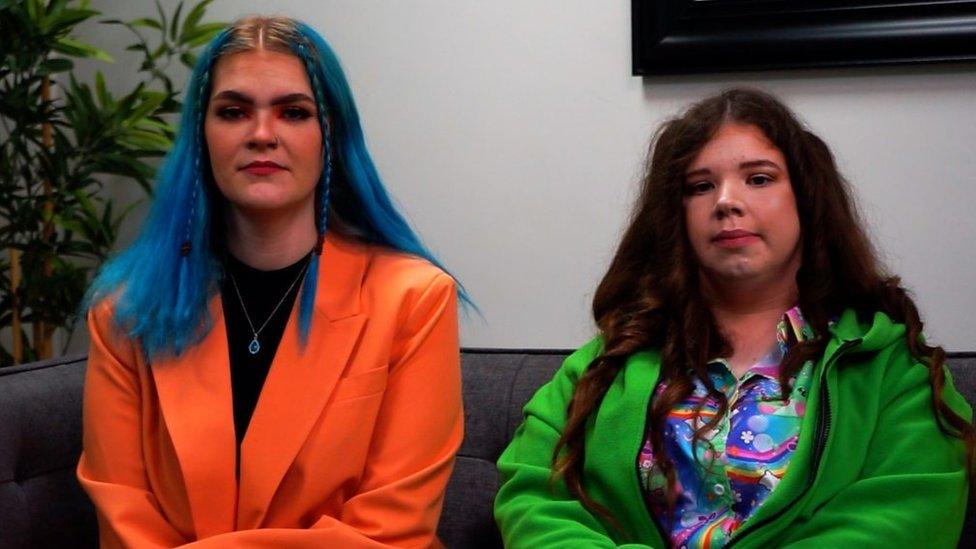Woman in care failed for most of her life by authorities - report
- Published

The woman spent most of her life in foster care (stock image)
A woman who has been in the care of the state for most of her life has been "failed at every turn by her legal parent", a report has revealed.
The 21-year-old woman is currently in a mental health hospital in England but wants to return to Northern Ireland.
A formal investigation by the Northern Ireland Children's Commissioner found a catalogue of failings over 21 years.
It criticised her legal parent, the Western Health and Social Care Trust, for systemic failings in her care.
The report, called 'Looked After? A formal investigation into the life of a child in the care of the state', is the first of its kind in Northern Ireland.
What happened to the woman?
Vicky, which is not her real name, was born in 2001.
Her parents had physical and mental health issues and, according to the report, Vicky "should have been treated as a child in need as soon as she was born".
That did not happen and her first 10 months were spent in hospital.
The investigation found that as Vicky grew older there was a "repeated failure to both fully understand and meet her needs on the part of several relevant authorities".
She spent most of her life with the same foster family which provided stability, but Vicky's learning difficulties and anxiety resulted in excessive school absenteeism.
At 15, her behaviour resulted in her being admitted to a residential home but it was unable to deal with young people who had complex needs.

Vicky spent most of her life with the same foster family
According to the report, it was not a happy time, with numerous arrests, breaches of bail and use of restraints.
It said the health trust did not find accommodation for Vicky after she was granted bail. Instead she went to the Juvenile Justice Centre.
Vicky remained there until just after her 17th birthday when she was placed in a secure mental health facility in England.
At the moment there is no plan in place for her to return to Northern Ireland.
Part of the issue is housing people with complex mental health needs in suitable accommodation.
BBC News NI can reveal that in the past five years 102 children have been placed in specialist treatment facilities outside Northern Ireland at a cost of more than £26m.
'She is not a number'
Writing from her sparse room at the facility in England, Vicky explained she has had enough and is not receiving the help she needs.
The Northern Ireland Children's Commissioner (NICCY), Koulla Yiasouma, said Vicky had been deprived of her liberty for six years.
Her dearest hope is that she can "come back home and live close to her family who she loves".
"She is not a case and she is not a number," Ms Yiasouma continued. "She is a young woman whose life could and should have been very different."
Other authorities involved in Vicky's care include the Regulation Quality and Improvement Authority (RQIA), the Education Authority and the Juvenile Justice Centre.
Ms Yiasouma said Vicky was "failed" by her legal parent, the Western Health and Social Care Trust.
As a corporate parent, a trust is responsible for safeguarding the child and promoting their wellbeing and welfare.
The commissioner said her office took up the case after they were alerted to a child with mental health issues in the care of the state who had been in the Juvenile Justice Centre and on remand for the best part of the year.

Koulla Yiasouma wants to see the young woman brought back to Northern Ireland
Ms Yiasouma said she was "deeply ashamed" of the lack of care Vicky received.
"In particular paying scant attention to the protection of her rights or best interests," she added.
The report makes 45 recommendations addressing issues dealt with by the Western Health Trust, Education Authority, Youth Justice Agency, and the departments of justice and health.
Only three are specifically about Vicky - the others are about improving the social care system.
Two-month deadline
NICCY said an independent expert clinician should be appointed to assess Vicky with a view for her to return to Northern Ireland.
An action plan should be agreed, the report added, and implemented based on the assessment.
Suitable accommodation and support services should be identified and secured as close to her hometown as is feasible.
A place should be available within a two-month deadline of Vicky being assessed, it continued.
Other recommendations include:
Ensuring timely identification of "children in need" and the planning and implementation of an action plan at relevant stages
All agencies should work together to ensure the child receives the best start and opportunities
Ensure that assessments are undertaken and recorded in a timely manner
The report cited dozens of adverse findings, including a failure to convene a pre-birth risk assessment conference before Vicky was born.
'Opportunities for learning'
The Western Trust said it will take time to consider the report in detail but it "clearly identifies serious issues of concern and must result in concerted action".
The trust's director of women and children's services, Tom Cassidy, said: "We would like to say sorry to Vicky and her family for the failings which were identified, this is unacceptable and needs to be addressed.
"Children's services have developed significantly since 2001," he added.
"Our multi-disciplinary workforce is now more aware of adverse childhood experiences and the potential impact on child development and attachment. However, this report clearly shows more work is needed."
He said it was important the trust and others highlighted in the report implemented the relevant learning and recommendations as a priority.
In a statement, the RQIA said it was "shocked at the poor outcomes for Vicky".
"No child should have to go through such experiences," it added.
"RQIA will fully consider this report and its recommendations, particularly in relation to the inspection of children's homes, and the follow up action."
The Education Authority said Vicky's case "highlighted clear opportunities for learning" and "we must listen and respond to the voices of vulnerable children in providing the best possible supports to meet their needs".
"We will now work to develop an action plan in response to the recommendations which we will share with NICCY," it added.
The Youth Justice Agency said it welcomed the report.
The agency's chief executive, Stephen Martin, said: "The safety and wellbeing of the young people in our care is of paramount important and as acknowledged by the commissioner, Youth Justice Agency staff acted with care and compassion,
"We will take stock of any lessons learned from the report's findings to further improve our practice."
Related topics
- Published22 June 2022

- Published30 September 2022
